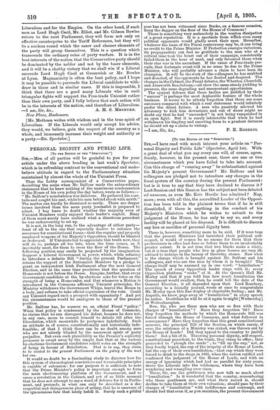PERSONAL DIGNITY AND PUBLIC LIFE. Pro THE EDITOR OF THR
"seserrroa.-] SIE,—Men of all parties will be grateful to you for your article under the above heading in last week's Spectator, which is in refreshing contrast to the conventional and make- believe attitude in regard to the Parliamentary situation maintained by almost the whole of the Unionist Press.
Thus the Lobby correspondent of a Conservative paper, describing the scene when Mr. Balfour made the extraordinary statement that he knew nothing of the unanimous condemnation in the House of his own policy the day before, wrote as follows :— " Mr. Balfour's nonchalance was delicious. He gathered his coat- tails and sought his seat, while his men behind shook with mirth." The matter can hardly be dismissed so easily. There are deeper issues involved than the more party journalist is prepared to admit. I beg leave to doubt whether the majority even of Unionist Members really enjoyed their leader's exploit. Many of them must surely have realised what a disastrous precedent he was endeavouring to set up.
It is not, in the long run, to the advantage of either party— least of all to the one that especially desires to enhance the reverence for constitutional forms—that the regular and properly employed weapons of his Majesty's Opposition should be blunted or destroyed. If Unionists fail to appreciate this truth now, they will do so, perhaps all too late, when the time comes, as it inevitably must, for them to cross the floor of the House. The following position may easily be projected by the imagination. Suppose a Liberal Government in power, which, while refusing to introduce a definite Bill "during the present Parliament," retains the support of the Nationalist Members by a pledge to grant an independent Irish Parliament after the next General Election, and at the same time proclaims that the question of Home-rule is not before the House. Imagine, further, that every Government candidate at the by-elections asks for votes on the strength of being a Home-ruler, and that whenever a Motion is introduced in the Commons affirming Unionist principles, the Ministry withdraws the Government Whips, leaves the House in a body, and refuses to take official cognisance of the vote. Could any Unionist regard such a prospect with equanimity ? And yet tho circumstances would be analogous to those of the present position.
Mr. Balfour has, he assures us, an official Fiscal "policy." When that policy is condemned by the House of Commons, he claims that he can disregard his defeat, because he does not, in any ease, mean to commit himself to details till after the Dissolution, which meanwhile he postpones indefinitely. Such an attitude is, of course, constitutionally and historically inde- fensible; of that I think there can be no doubt among men who are not utterly blinded by the narrowest spirit of party prejudice. But even such plausibility as the Premier's sophistry possesses is swept away by the simple fact that at the various by-elections Government candidates solicit votes on the strength of being in favour of Retaliation. That is to say, they claim to be elected go the present Parliament on the policy of the next but one.
It would no doubt be a fascinating study to discover how far this system of chronological convictions and terminable principles is capable of extension : for our purpose it is sufficient to note that the Prime Minister's policy is important enough to form the main electioneering platform of the Government, and to cause a revolution in tho Cabinet, and yet of so little moment that he does not attempt to say a word of defence for it in Parlia- ment, and pretends, in what can only be described as a dis- respectful and disingenuous piece of acting, that he is unaware of the ignominious fate that lately befell it. Surely such a pitiful There is something very melancholy in the wanton dissipation of a great reputation. It is a spectacle from wllich even many political opponents would gladly avert their eyes. Hereafter, whatever the issue of the Fiscal controversy may be, it can bring no credit to the Prime Minister. If Protection emerges victorious, its propagandists can feel no gratitude to the man who at a critical time took the heart out of their campaign, consistently failed them in the hour of need, and only favoured them when their star was in the ascendant. If the cause of Free-trade pre- vails, that fortunate event will in no sense be due to the Prime Minister, who will probably advance a claim to have been its champion. It will be the work of the colleagues he has snubbed and deserted, of the opponents he has flouted and despised. The changes in the Cabinet, the Fiscal debates, the Wharton, Churchill, and Ainsworth Resolutions,—all show the same steady yielding to pressure, the same degrading and unrepentant opportunism. The cynical defence that these tactics are justified by their " success " is perhaps the most deplorable feature of the whole business. It seems to be utterly forgotten that there are some successes compared with which a real statesman would infinitely prefer the direst failure. A man who passively allowed his adversary to kick him downstairs and out of doors might no doubt say that he had "succeeded" in not being vanquished in an open fight. But it is surely intolerable that when he had withdrawn his tingling and smarting form to a prudent distance he should set up a claim to victory.
—I am, Sir, &c., P. E. ROBERTS.










































 Previous page
Previous page